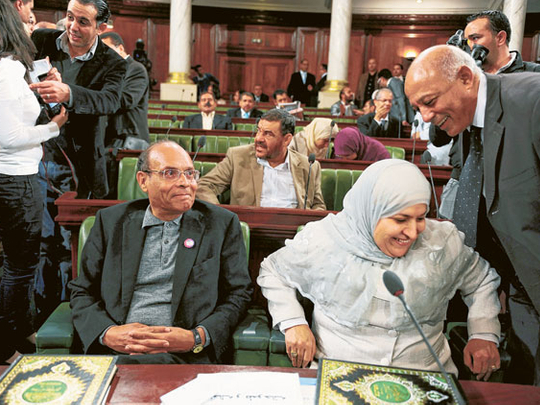
Tunis: Tunisia's newly-elected assembly held its inaugural meeting on Tuesday, ready to start shaping the constitution and the democratic future of the country that sparked the Arab Spring uprisings.
A moderate Islamist party, Al Nahda (Renaissance), won the most seats in the Constituent Assembly, and it has announced a coalition with a liberal and left-of-centre party to make up the interim government. The coalition holds a comfortable majority of 139 seats in the 217-member body.
Lawmakers were elected last month in Tunisia's first free vote — the first resulting from the Arab Spring protests. Tunisian protesters drove out their longtime president in January. Tunisia's new assembly is being watched as an example amid violence in Egypt ahead of its elections and escalating tensions in Syria.
Women's rights
Tunisia has been spared the violent clashes of its North African and Arab neighbours, but there has been some continued unrest.
Outside the assembly building in a suburb of Tunis, 1,000 people demonstrated yesterday from dozens of different associations, many representing women calling for their rights to be guaranteed in the new constitution.
Under dictator Zine Al Abidine Bin Ali, Tunisia had some of the most progressive laws for women in the Arab world, something its secular elite fear might be lost. Al Nahda, as well as its coalition members, has promised to maintain women's rights.
Newly-elected Al Nahda candidate Souad Abdul Rahim, an outspoken professional who does not wear the traditional Islamic headscarf, was heckled yesterday by demonstrators demanding that she resign.
Souad raised a firestorm of criticism earlier by calling single mothers a "disgrace," she later retracted her comments and described them as victims.
Also protesting were relatives of those killed and wounded in the month-long uprising that began in December, calling for justice against the security forces.
"We will seek to ensure that the national constituent assembly will complete its tasks, write a new constitution for the country and call for new elections within a period that should not exceed one year," said the statement signed late on Monday by the new coalition.
The coalition will present the assembly its candidate for interim president, veteran rights activist Munsif Marzouqi who heads the liberal Congress for the Republic Party. He will then appoint a prime minister, Al Nahda's number 2, Hammadi Jebali, and Mustafa Bin Ja'afar of the Ettakatol Party as the leader of assembly.
- Tunisia
- Area: 165,000 square kilometres (64,000 square miles)
- Population: 10.5 million
- Constituent Assembly:
- Total Seats: 217
- Parties:
- Al Nahda: 89
- Congress for the Republic: 29
- Popular Petition: 26
- Ettakatol: 20
- Progressive Democratic Party: 16
- Modernist Democratic Pole: 5
- The Initiative: 5
- Tunisia Horizons: 4
- The Revolutionary Alternative: 3
- Social Democrats Movement: 2
- People’s Movement: 2
- Maghrebin Liberal Party: 1
- Equity and Equality Party: 1
- Progressive Struggle Party: 1
- New Destour Party: 1
- Democratic Social Nation Party: 1
- Cultural Unionist Party: 1
- Free Patriotic Union: 1
- Democratic Patriots Movement: 1
- Independent lists: 8
- Seats by gender: 73% men – 27% women (49 seats)
- Who voted? :
- 4,308,888 people voted – 52% of those eligible to vote.
- Total number of Tunisians eligible to vote: 8,289,924
- Turnout of registered voters: 86%
- Turnout of registered voters abroad: 29.8% (214,231 out of 720,100)
- Constituent Assemblies in Tunisia: 1957 and 2011.
- Legislative elections in Tunisia: 1959 · 1964 · 1969 · 1974 · 1979 · 1981 · 1986 · 1989 · 1994 · 1999 · 2004 · 2009
- Presidential elections in Tunisia: 1959 · 1964 · 1969 · 1974 · 1989 · 1994 · 1999 · 2004 · 2009












